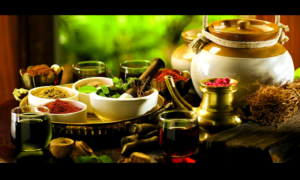Ayurveda is a holistic system that takes into consideration diet, exercise, relaxation and lifestyle. It views good health as total well-being, of the body, mind and soul. Generally speaking, the ancient sages of India placed high value on raw, natural foods and fresh fruit and vegetable juices. In fact, the detoxification of the body through raw foods and juices was considered to be the first step in curing disease and achieving good health.
When we talk of natural foods, we include the ones that can be eaten raw, those that are naturally derived and those that are unrefined and unprocessed. Not only do they detoxify the system by promoting the elimination of wastes, but also bring about a sense of well-being and vitality. This is because they ensure the body receives the essential nutrients and help in achieving the desired acid-alkaline and sodium-potassium balances.

Ayurveda advocates a diet is high in fresh fruits and vegetables, unprocessed cereals, sprouted grains, nuts, seeds, yogurt, can make one look and feel much better. The vitamins, minerals and trace elements found in natural foods are extremely essential to the immune system too, protecting the body from disease, degeneration and premature ageing. The diet should provide enough bulk to keep the digestive tract cleansed of toxins and wastes.
Constipation and accumulation of toxins and wastes reflect on the skin, in terms of congestion, dull skin, blackheads and eruptions. The diet should be low in fats, to prevent clogging up of the arteries and veins.
A low fat diet helps control weight gain. The diet should be high in minerals, which provide energy and vitality and also help skin and hair. Keep to a low salt diet. Excess salt leads to retention of fluid in the body and slows down circulation. Sometimes, it can make the face and area around eyes look puffy. For congested skin, a low salt diet is advocated.
Fresh, organic foods are recommended by Ayurveda, so that the body is supplied with nutrients. They not only contribute to good health, but give the skin a radiant glow. The general feeling of well being and vitality actually improves the mental outlook, helps the body to cope with stress, boosts self confidence and adds a zest to life.
Herbal teas, made of herbs and spices, have been an integral part of Ayurveda, for their many benefits, like aiding digestion, warming the body, calming the nerves, helping weight loss and so on. Among the spices used in Ayurvedic teas are, cinnamon, clove, cuminseeds, black pepper, cardamom, fennel (saunf), nutmeg (jaiphal) and so on.
Spices are actually medicinal herbs and are used in foods to alter the qualities of food items, reducing their negative effects and aiding digestion. In Ayurveda, ginger is known as “a universal remedy” because it has so many benefits. Ginger boiled in water can be had as ginger tea. Ginger tea is advised after meals for digestion and is used in coughs and colds. It has anti-inflammatory properties too and keeps the skin clear of acne and other blemishes.
In winter, spices can be added to tea. Among these are, cardamom, cinnamon, ginger or lemon grass. You can also add spices to tea itself, like Ginger, Cardamon (elaichi), Cinnamon (dalchini) or pepper to keep the body warm.
Whenever we have gone away from Nature, we have suffered, in terms of losing health and beauty and even in destruction to the world we live in. I firmly believe India has a great deal to offer the rest of the world, by way of our great tradition of herbal healing. Today, the entire world is looking at Nature with enlightened eyes and at holistic systems like Ayurveda.